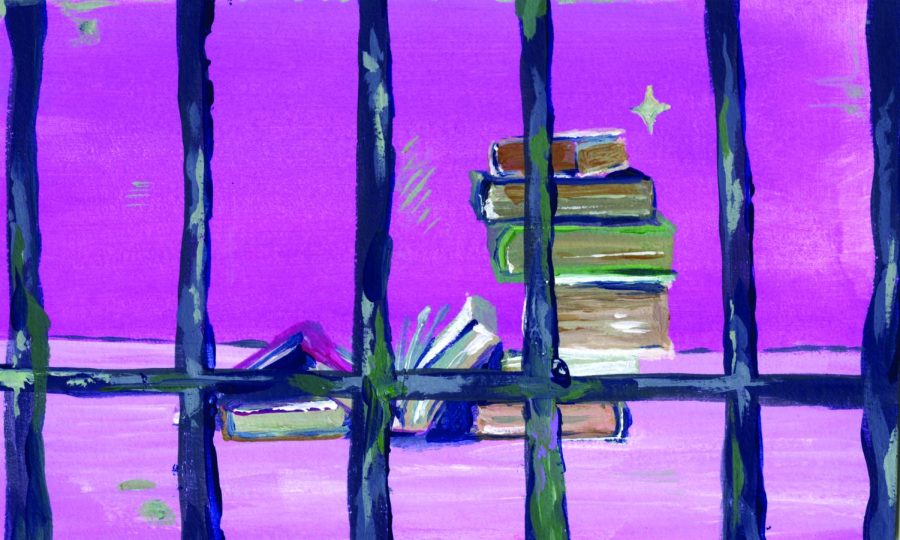Book policy helps navigate controversy
Selection process helps avoid removing books from shelves
April 12, 2022
As activists across the country push to ban books in school libraries and classrooms, specifically on topics surrounding critical race theory and sexuality, educational leaders face difficult decisions. Hockaday, however, has processes in place to deal with these complaints and respond to requests.
Books such as “Woke: A Young Poet’s Call to Justice,” a collection of poems by women of color, “When Wilma Rudolf Played Basketball” by Mark Weakland, “L8r, G8r,” by Lauren Myracle, have been formally requested to be removed from school libraries in Dallas suburbs. The objections cited were racial prejudice, sexual explicitness and promotion of terrorism.
Texas legislators have passed a law outlining the way teachers should instruct students on subjects of race and gender. Gov. Greg Abbott has directed education regulators in Texas to investigate the books in public schools, citing as a concern the availability of pornography. Opponents argue this is an excuse for books on gender and racial issues to be kept from children’s eyes.
Public library practices
Public libraries in Dallas, not affected by the law, self-judge what should be in their selection of books.
“It becomes a question of where the item is shelved, children’s area or adult area or behind a desk,” said Melissa Dease, Communications & Youth Services administrator at the Dallas Public Library.
Recently the Dallas Public Library has had to deal with some complaints.
“Our policy includes a form for the complainant to fill out, then a review team considers the complaint as well as considering the merit of the material,” Dease said. “People who live here understand that we serve a very diverse population with a wide range of interests and experiences, and our collection reflects that.”
Hockaday policies
Similarly, Hockaday has systems in place to avoid this controversy and book banning has not been a pressing matter in the Upper School. The librarians and English and history departments work to curate the curriculum with educational literature avoiding obscenity.
“Included in the libraries’ collection development policy is the process by which all challenged materials are handled, beginning with discussions between the challenging party and the librarians, as well as division heads if necessary,” librarian Corey Lott said. “Should the concerned individual wish to file a formal challenge, a copy of the Collection Development Policy and a Request for Reconsideration of Library Resources form is delivered to the challenging party.”
Within 10 days of the request form, a committee including the Division Head, school counselor and librarians will examine the book, read professional reviews determining its professional acceptance and weigh the value and faults of the resource holistically. The committee will discuss the book considering the school’s curriculum and mission and discuss it with the concerned individual, finally preparing a written report to be retained by Lott, the Director of Libraries and Academic Research.
Although these policies are in place, Hockaday seems to have avoided many conflicts regarding the content in class.
Parental trust
“I think our parent community trusts the teachers to make good choices,” said Janet Bilhartz, English department chair.
The majority of the Upper School will not be reading books in English with adult content with the exception of senior seminars, Bilhartz said. However, by this age, the students can handle the more mature literature.
“I remember a work of literature that we taught in the year 1999 or 2000, a long time ago, that was in an honors English class,” Bilhartz said. “The headmistress at the time responded to the parent very politely by saying that’s the book they read in the Honors English class and if you’re troubled by it, your daughter may move into the regular English class and they don’t read that book there.”
The English department looks out for the most controversial content.
“The most controversial would be racial language and as I said, we’re usually pretty careful with things such as we don’t teach sexually explicit literature to younger students,” Bilhartz said.
Apart from examining current books, parents and alumnae have advocated adding books to the curriculum as well.
“In the wake of the George Floyd movement a couple of years ago, we had alumnae reaching out to the school as a whole about their desire for Hockaday to represent through what it teaches, and its faculty and its students, the diversity of America today,” Bilhartz said.
The English department is currently looking at adding another book to the curriculum that pays attention to the need for diversified authors and content.
Encouraging discussion
“I think we have done a good job with that for a long time, but it doesn’t mean we couldn’t do a better job and we’re looking at our curriculum all the time,” Bilhartz said.
The English department recognizes the importance that all members of the school community feel welcome to bring up questions and concerns to the teachers.
“We value the voices and perspectives of parents, students and other members of our community,” Upper School English teacher Jason Goldstein said. “We all have different experiences, and discussion can promote understanding and empathy.”
Faculty deliberate over books and the purpose they will serve for the students before they are added to the class.
“When it comes to questionable moments or controversial topics, we consider the teaching opportunities that they may offer,” Goldstein said. “How can these questionable moments or controversial topics inspire discussion, reflection and ultimately, understanding? How do these texts help to raise awareness of prejudice and injustice?”





